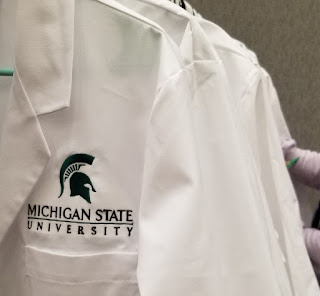MSU Makes Available Graduating Health Care Students to Aid in COVID-19 Response
As a result of Gov. Gretchen Whitmer’s continued efforts to increase the speed at which health care professionals can get into the workforce to assist with COVID-19, these health care systems will soon have access to 87 baccalaureate-prepared nurses, 61 medical doctors and 213 osteopathic physicians. MSU is working with the Department of Licensing and Regulatory Affairs (LARA) in expediting the licensure of health care professionals entering the workforce.
“MSU has one of the largest training programs of health professionals in the nation," said MSU Executive Vice President for Health Sciences Dr. Norman J. Beauchamp, Jr. “We recognized early in the pandemic that additional providers would be needed. We actively pursued a pathway to make it possible. Adding more than 350 medical professionals to the health care workforce at this critical juncture will make a substantive difference in combating this virus. Together, everything is possible.”
Students in the colleges of Human and Osteopathic Medicine normally start their residencies July 1. With this licensing option, graduates can enter the workforce ahead of their scheduled residency — before the end of April. Graduating students have each completed eight years of college education and thousands of hours of clinical activity as part of their learning.
“The College of Osteopathic Medicine has been a leader among Michigan medical schools in the number of graduates that go on to practice medicine in the state,” said Andrea Amalfitano, dean of the College of Osteopathic. “Around 65 to 70% of our osteopathic medical students stay in Michigan to practice. The decision to expedite our graduates entering the physician workforce sooner in the face of the COVID-19 pandemic is something that furthers our long-standing goal, namely, to provide the state of Michigan great doctors who provide quality care for its residents.”
“Our newly licensed MDs are clinically experienced and well prepared to serve the needs of Michigan hospitals in this unprecedented health crisis,” Aron Sousa, interim dean of the College of Human Medicine added. “This initiative of rapidly increasing the number of physicians in our hospitals is a core part of MSU’s contribution to the COVID-19 effort in our communities throughout the state.”
Early licensing is also available for nursing students across Michigan. Before entering the workforce, nursing students are normally required to pass their NCLEX-RN exam to become licensed. However, LARA has set-up a temporary license for RN students to allow MSU’s nursing students to become available as practicing registered nurses before taking the exam. At the end of their program in May, these graduating nursing students will have 740 contact hours through the nursing program.
“Nurses are on the frontlines of this pandemic, so it makes sense that the governor would create this opportunity for new nursing graduates to enter the workforce during this time of desperate need,” said Randolph F. R. Rasch, dean of the College of Nursing. “We need all the help we can get to provide the necessary and increasing amount of care for Michigan residents, and this is a bold first step by the governor.”
See original MSU TODAY statement here.




Comments
Post a Comment